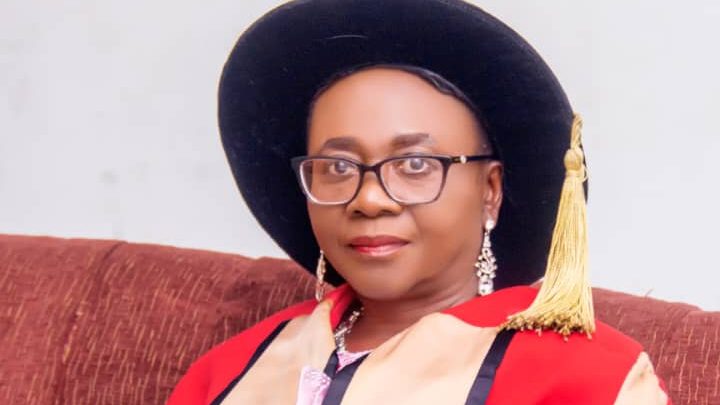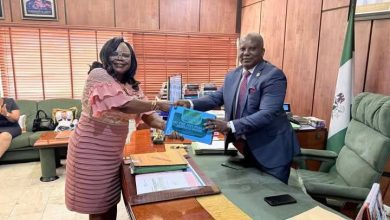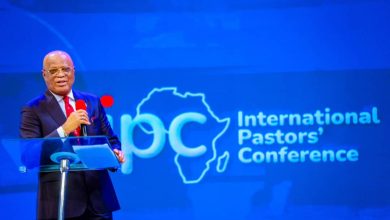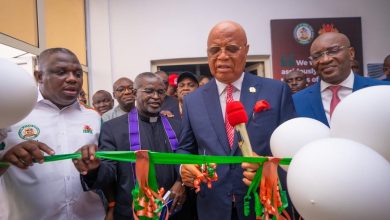
Professor Eno-Abasi Urua is considered one of the most cerebral and influential academic dons on the African continent.
In a professional career stretching decades, she has crisscrossed the globe, contributing to the advancement of languages. Her contemporaries, students and the public attest to her vast knowledge of languages and effective use of same.
Through her academic contributions, she has championed the bold objective of emboldening the African identity through the vigorous development of the continent’s languages and dialects.
Her collections include works in different languages as captured in over eighty-five publications, published in Nigeria, Europe, Asia and America.
The Ibibio Language spoken by the Ibibios in Nigeria is a major beneficiary in this regard. Not only through language development and other academic endeavours, but Prof Eno Urua has also helped reshape the perception of African history, culture and place in global affairs.
Read Also: Renowned University Teacher, Prof Urua To Mark 65th Birthday With Book Launch, Monday
Born in Mbiaya Uruan in Uruan Local Government Area of present-day Akwa Ibom State, Nigeria, on May 30, 1957, she was the first of fourteen children born to her parents, Etubom Essien Usung Urua and Mrs Maria Edet Okon. Both parents were teachers.
Her long and glittering journey in formal education started at the now-defunct Government Practicing School, Uyo, where she earned her First School Leaving Certificate (FLSC). The school is now the Town Campus of the University of Uyo where Prof Urua is a member of the academic staff.
The FSLC was a trigger for what would later become a ride to the zenith of academic pursuit. Etinan Institute (formerly Qua Iboe Mission Secondary School) was where she bagged her West African School Certificate in 1975 and proceeded to the University of Calabar to bag a Bachelor of Arts (Education) in English in 1980. She had her Master of Arts in Linguistics and PhD in Linguistics from the University of Ibadan in 1987 and 1990, respectively.
Her undying quest for knowledge also took her beyond the shores of Africa as she attended the University College London, England, UK, 1997; University of Edinburgh, Scotland, UK, 1993 – 1994 and the Universitaet Bielefeld, Germany, 2000-2001.
Her career highlights paint a picture of passion, consistency, dexterity, vivacity and utmost efficiency. She cut her professional teeth in the defunct South Eastern State Ministry of Home Affairs and Social Welfare, Calabar, on June 11, 1975, as a Clerical Officer, and later became an Assistant Executive Officer in the same Ministry on December 1, 1975.
Read Also: Ibeno Offers Land For African Campus of UK’s St. Saint Thomas-a-Becket University
She made a foray into academia in August 1981 as an Assistant Lecturer at the School of Arts and Science, Uyo. She joined the old University of Cross River State as a Teaching Assistant in 1985, having left her role as Lecturer II at his previous job in 1985.
Between 1985 and 1991, Prof Urua rose from a Teaching Assistant, Assistant Lecturer to a full-fledged Lecturer in 1990 before transiting from UNICROSS in 1991 to join the University of Uyo as a Lecturer II in 1992. She rose through the ranks and became a Professor in 2002.
She has been one of the mainstays of the Department of Linguistics and Nigerian Languages of the institution.
The academic don’s exploits during her professional career stretch like a marathon race. No successful attempt can be made to list all – not even herself can recollect all the details to the dot.
However, listing a few would suffice. She served as a Member, University of Uyo Senate, 1992-1993, 1995-2000, 2001- date; Faculty Representative on the University Research Committee, 1992-1993; Acting Head, Department of Linguistics & Nigerian Languages, 1992-1993, 1995-2000, 2001-2004.
Worthy of mention is the fact that it was during her tenure that the Department of Linguistics and Nigerian Languages obtained approval from the Senate to commence Postgraduate Studies in 1996.
Other positions include Faculty Representative to the Postgraduate School Board, 1998-2000; Member, Editorial Board, Faculty of Arts Journal of Humanities; Chairperson, Faculty of Arts Committee on Research Writing and Publication; Member, Board of School of Continuing Education; Coordinator, Faculty Committee on Computer Literacy; Dean, Faculty of Arts, 2006-2008; Director, Office of International Programmes, 2008-2012; Member, University Convocation Planning Committee; Pioneer Director, Centre for Gender Studies, 2013-2017; Chairperson, Planning and Local Organising Committee, First Faculty of Arts International Conference, 2014; and Member, Staff Awards and Commendations Committee, 2017 2021.
Read Also: Federal University of Technology in A’Ibom – Gov Emmanuel Lauds President Buhari
Others are Vice President 1, University Women Association (UWA) 2016- date; Member, National Technical Committee for the Development of a Language Policy for Nigeria, 2016 – date; Chairperson, LOC, National Association of Women Academics 4th International Conference, University of Uyo, Member, Esop Ndito Uruan, University of Uyo; Member, Mbiaya Uruan History Writing Committee; Member, Nka Nkparawa Mbiaya Uruan; National Vice President, National Association of Women Academics; Member, University Women’s Association, University of Uyo; Member, Women in Nigeria (WIN); Treasurer, Women in Nigeria (WIN) 1996-1998; Member, Consultative Committee, Federation of Akwa Ibom Women Associations (FAIWA); Secretary, The Presbyterian Church of Nigeria (Four Towns Congregation) Building Committee, 1996-2000, among others.
Her publications include: Ibibio Phonetics and Phonology; Language Development Beyond Borders (with Moses Ekpenyong and Firmin Ahoua), Nwed Usem Ibibio – Ibibio Dictionary (with Moses Ekpenyong and
Dafydd Gibbon), Yak Ikpeeb Ibibio (with Afiong Isok, Escor Udosen and Okokon Akpan).
Her works also include translation of APRM (NEPAD) document into the Ibibio Language, February 2008; translation of AK-SEEDS abridged version document into the Ibibio Language for Akwa Ibom State Ministry of Economic Development, 2005, 2006; translation of International Teachers’ Day Document, 2005; Member, Translation team of the Holy Bible into the Ibibio language (Old Testament – ongoing); Member, Translation team of the Holy Bible into the Ibibio Language (New Testament); Occasional Reviewer for Nigerian Languages Studies, 1999; and Reviewer for local and international journals.
She has been involved in collaborative research projects in the areas of Linguistics, Language Documentation (LD), Human Language Technology (HLT), Computational Language Documentation (CLD), Speech
Technology (ST) – Speech Synthesis and Speech Recognition, with a special interest in African tone languages.
Some of the projects include the Science and Technology Education Post Basic (STEP-B) Project on ‘Towards Generic Text-to-Speech: Applications for African Tone Languages’ – Federal Government of Nigeria/World Bank Assisted Grant (2011-2012), documentation of dirge songs among the Uruan people of Nigeria (funded by ELDP SOAS, University of London) 2011-2012; STEP-B/World Bank funded project on Text-To-Speech of African Tone Systems, 2009-2012; Computational Documentation of Local Languages funded by DAAD (German Academic Foundation), 2002-2006; Lenition in Ibibio (with Professor John Harris) Department of Phonetics
and Linguistics, University College London September 1999; the Linguistic Situation in Akwa Ibom State, Nigeria, University of Uyo.
Her works have earned her numerous recognitions and membership in professional bodies outside Nigeria and Africa. She is a Member, Executive Committee, Comite Intemational Pemanent des Linguistes (CIPL), Leiden, in the Netherlands; Member, Britain-Nigeria Association; Advisory Committee, Co-Lang 2012, University of Kansas, USA; General Secretary, Nigerian National Union of UK Edinburgh Branch, 1993-94; Member, Committee Poznań Studies in Contemporary Linguistics, Poland; Editorial Board, Journal of African Languages and Linguistics (JALL), Leide, Member, Comite Internationale Permanent des Linguistes (representing Africa), among others.
In all, she has produced more than eighty-five publications which have been published in Nigeria, Europe, Asia and America.
Professor Urua is a member of several professional bodies such as the Nigerian Academy of Letters (NAL), Linguistic Association of Nigeria (LAN), West African Linguistic Association (WALS), Ibibio Language Writers’ Association (LWA), English Language Teachers’ Association (ELTA), Association of Nigerian Language Teachers (ANLAT), Royal African Society (RSA).
She is a distinguished Fellow of the Nigerian Academy of Letters (FNAL) and a Fellow of the Linguistic Association of Nigerian (FLAN).
She has attended local and international conferences and workshops and is a recipient of several national and international research awards including the prestigious Alexander von Humboldt-Stiftung (George Foster) Fellowship Award, 2000 – 2001; the Association of Commonwealth Universities Post-Doctoral Fellowship Award, 1993 – 1994; University of Cross River State Staff Development Award – 1985-1989; Best MA Result in the Department of Linguistics, University of Ibadan -1987; Cross River State Government Scholarship, 1976 1980; Best Higher School Certificate Result – June 1975.
‘A goldfish has no hiding place,’ the saying goes. Prof Eno-Abasi Urua courtesy of her exploits has earned several honours including the 2017 Mboho Mkparawa Ibibio Excellence Award in Leadership, Research,
and Teaching; UTUENIKAN USEM IBIBIO by the Department of Linguistics and Nigerian Languages, University of Uyo; traditional title holder of Obonganwan Ifiok in Northern Uruan, and several others.
A women’s rights activist, mother and staunch member of the Presbyterian Church, Prof Eno-Abasi Urua has devoted her life to serving humanity via impartation of qualitative education, philanthropy and exemplary exploits.
At 65, she shows no sign of slowing down. This is evident in the quantum of her everyday itinerary. Her career is waxing stronger as ever. She is currently handling works such as editing a book on Language and Politics in Nigeria, editing a book on Tone in Nigerian Languages, editing a book on a tonal Grammar of the Ibibio, Foot and Lenition in Ibibio (with Professor John Harris, University College London); Developing appropriate computer software for writing African Languages, as well as field methods in Language Documentation on course book (with partners in Bielefeld and Abidjan).
The profile and antecedents honed for decades have been meritorious. At 65, she is blazing strong, offering promises of more to come.
Professor Eno-Abasi Urua is indeed a pathfinder and inspiration to many across the globe.




